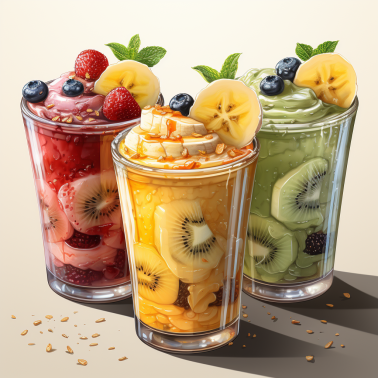
Smoothies have become the go-to for many health enthusiasts, fitness gurus, and even the everyday individual. These nutritious concoctions provide a quick and delightful way to ensure we're getting our daily intake of fruits and vegetables. But the age-old question persists: Is every ingredient you toss into your blender benefiting your health? Recent research from the University of California, Davis, suggests that it might be time to reconsider that banana you’ve been adding to your morning blend.
The Impact of Polyphenol Oxidase
The central focus of the study, published in the Royal Society of Chemistry’s journal Food and Function, is on an enzyme known as polyphenol oxidase, present in a variety of fruits and vegetables. This enzyme's primary function is to accelerate the oxidation of polyphenols in plants. But how does it relate to our smoothies?
Well, the researchers used this enzyme as a benchmark to determine how it affects the body's absorption levels of flavanols. For those unfamiliar, flavanols are bioactive compounds with a plethora of health benefits. They play a vital role in promoting heart health, improving cognitive functions, and have strong antioxidant properties. Some of our favorite smoothie ingredients like apples, blueberries, and grapes are packed with these flavanols.
The Smoothie Experiment
Javier Ottaviani, the lead author of the study, aimed to delve deep into the practical implications of these findings. He shared, “We sought to understand, on a very practical level, how a common food and food preparation like a banana-based smoothie could affect the availability of flavanols to be absorbed after intake.”
Ottaviani's association with Mars, Inc. and his adjunct researcher position at UC Davis Department of Nutrition gave the research additional credibility and context.
So, What Did They Find?
While the results need a deeper dive to be fully comprehended, the preliminary findings suggest that the presence of certain levels of polyphenol oxidase can indeed influence the flavanol absorption rate. In simpler terms, when you blend a banana, which has a significant amount of polyphenol oxidase, with flavanol-rich fruits, you might be reducing the nutritional boost your body receives.
Rethinking Our Smoothie Ingredients
While bananas are a beloved choice for their creamy texture and natural sweetness, it might be time to reconsider its place in your smoothie if you're seeking a flavanol-rich drink. Alternatives like yogurt, almond milk, or even avocado can provide that creaminess without potentially compromising the nutritional value of other ingredients.
Final Thoughts
While more research is undoubtedly needed to determine the full extent of this enzyme's impact, for now, it might be worthwhile to switch up your smoothie routine. After all, the world of fruits and vegetables offers a myriad of combinations to keep your taste buds happy and your body healthy.
Remember, it's not about entirely ditching the banana but understanding how to maximize the nutritional benefits of every sip you take. Cheers to smarter, healthier smoothies!
